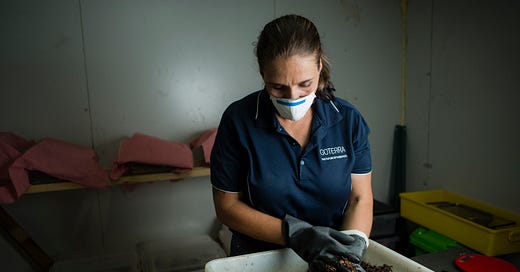Olympia Yarger is an Australian chicken farmer turned green techpreneur.
She launched Goterra in 2016 as an automated biotech food waste management service: maggots in capsules consume food waste at a rapid pace while their AI-powered ‘bot’ managers carefully monitor temperature levels and the feeding process.
It’s an ingenious solution to the 1.3 billion tonne food waste problem and the 3.3 billion tonnes of CO2 equivalent it releases as it decomposes. Goterra’s method eliminates the composting process, slashing CO2 emissions per tonne by 98%. The byproducts - frass and fat maggots – become valuable fertiliser and animal feed.
When I first spoke to Olympia 1.5 years ago, Goterra processed 10 tons of food waste per week. Today, she says, that figure is at 100 tons of waste per week:
“We’ve grown the colony to service large volumes of waste, we've brought on new clients, we've grown the team from 15 people to 40 – I’ve aged!
“It's all the components that come with a business but under the shroud and challenge of COVID; it has been truly a very odd time. There’s no comparison to this moment in our lives.
“But, on company traction, we deployed our first autonomous unit to go do its work by itself. It’s had zero down days. It sits in a precinct in Darling Harbour and Sydney and manages the food waste from the three towers above.
“We visit once every 12 days to put new maggots in and take the old maggots out. The unit accepts waste, treats it and then feeds itself every day. I can turn it on or off or do whatever I like from my phone and camera. You've got this incredible capability that is deployed from our system into a new market without having to build tons of infrastructure to service it.”
Goterra typically services high-level food waste sites like farms, restaurants, hospitals and city councils, but its now both expanding into residential blocks and aiming to service entire towns with a large capsule stack that can process at least 2 tonnes per day: “You can deploy Goterra stack infrastructure co-located on the waste management facility and unlock waste management capability for that entire city or town,” Olympia explains.
“We've learnt a lot in this past year, and we've made a lot of mistakes. But I think overall, we've really moved some mountains on what it has meant for us to commercialise.”
What impact has the ongoing situation with Covid and lockdowns had on demand?
Through the first wave of lockdown, we saw a real change of focus. So where we thought a lot of waste was going to come from hotels, restaurants, schools – all those things were closed or operating differently. There was this interesting phase where everyone was buying backyard chickens, and in Canberra, the cost of a chicken went from $20 to $65. Everyone was baking sourdough bread, having chickens, and composting. We started getting so many requests from multi-unit dwellings and apartment buildings because they don’t have composting opportunities.
Even though they're a consolidated aggregated load, 200 people in a building, getting 200 people to put the food waste in the right bin, requires specific education and engagement. It was a really good time for us to see if we could crack that difficult problem and find ways to meet those clients where they are and help them with a solution that works.
What have you learnt about driving consumer demand for a sustainable lifestyle and services?
Give people more flexibility to feel like they’re contributing and less restrictions
People want it to be easy. We want to contribute but we don't really want to do a lot of extra work, right, and so that's okay. We found that if we gave apartment block dwellers caddies, we recommended a compostable bag that our process can handle, and we accept contamination of difficult things, that encourages uptake – because people are like, ‘oh, this is super easy. You can just put anything in the bin.’
People's perception of the effort it takes to do good, and their willingness to contribute that effort aren’t the same
People think it's a lot to just to put their food waste in a different bucket.
If you say, ‘ah, but only some can go in there, not this, but that,’ it gets too hard, and they already feel like they’re making an extra effort.
That was a really good lesson for us to learn early: ‘Meet the customer where they actually are, solve the problem they actually have. Don't solve the problem that's easiest for you to solve.’
We're getting great engagement with some customers that really have been largely underserved otherwise.
What’s the biggest obstacle you faced?
The biggest obstacle was that I walked around as a woman in a man’s world demanding that people sell me hardware.
It takes courage to create something different
I think I can't ever underestimate the difficulty of standing up, every day, walking out into the world and just trying to do things differently. Everyone goes; ‘stop it. We don't like it when that happens.’
It is difficult, honestly, to create hardware that has never been created before or hacked and that doesn't exist in the world. When you try to do something that's never been done before, you run up against unconscious bias from the people who are selling you the stuff and the people who generally would install or create those functions.
Air conditioners are a classic example. I wanted to use air conditioners in a certain use case, and every time I tried to get an air conditioning supplier to install one for me they would come out and tell me they would not install an air conditioner in that location because it would void the warranty. I don't give a shit about the warranty. I don't care if it dies in six months, I want to see if it works. And they were like, ‘no, we don't want to do that, because that's not how conditioners are used.’
It can be exhausting sometimes because you're already at the boundary of your own confidence in trying to figure something out. You are already pushing your own perception of what you should achieve, and a person who's supposed to be an expert is telling you you're also a moron. ‘I already hear that every day in my internal monologue, I do not need to hear it from you.’
How has the team grown in the last year?
We had this big hiring bubble and in the space of three months, we brought on 15 new people and after about a month you could tangibly feel that Goterra had grown up: people were using our tenants and values and engaging in meetings in a specific way that we've created. They became our flag bearers. I found that just so profoundly beautiful to see it evolving.
My head of growth is a phenomenal individual, when he came on, he was so energised and people were like, ‘oh my God, I can't keep up, he's just so flat out.’ I said to everybody, ‘he's gonna turn up and make you feel like you're not moving fast enough. Just remember that it's because he hasn't been in the boat rowing as long as we have. He's new, he's fresh, he's rested.’
But that's infectious, right? When you get new people and they’re like, ‘how cool is it to work at the maggot robot company.’
I always expected that one day I'll wake up and go, ‘oh, remember when we were in the shed and now we're at 6,000.’ But instead, these little micro growth experiences are beautiful and special.
What has brought you the most joy?
We’ve just crossed some big milestones, and we’ve been in lockdown for two months or so and last Friday we played cricket for a couple of hours. It was the first pseudo-social outing that we got to have. Just seeing the team that we built who wanted to stay at work to hang out with each other having fun and in inside groups talking about the work they’re doing. You can get so stuck in the operations of that team that you can forget sometimes that you’ve built this group of people that are performing at a high level and making connections through and by the company. And that just felt really beautiful to see that in real life, and to know that we've done it. It felt like a real achievement.
How would you describe your life philosophy or motto?
Never ever, ever, ever, ever, ever give up. And all the evers are important.
Eco-living hacks I’m loving:
Whogivesacrap – toilet paper that's good for the planet. It’s made from 100% recycled paper and bamboo and 50% of profits are donated to build toilets for people who don't have any. I love everything about this brand. Check them out with my affiliate link.
Community Notices
Share your product, services, book, or announcement to the Green Techpreneur. Must be a good fit for the climatetech and entrepreneur community.
Make a Connection
Whether you’d like to find a mentor, an employee, a job, a business partnership, or just meet someone new over a virtual coffee who’s just as passionate about building greentech businesses – hit the button below and I’ll post a shout out for you in the next newsletter.















Share this post